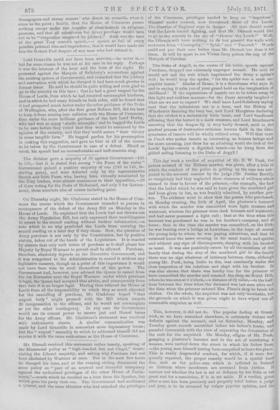Lord Granville could not have been nervous,—he never is,— but
for some reason he was not at his ease in his reply. Perhaps it was the lateness of the hoar and the heat of the night. He protested against the Marquis of Salisbury's accusations against the existing system of Government, and remarked that the jobbery and corruption with which he charged it had been much greater in former times. He said he should be quite willing and even glad to go to the country on this issue ; that he had a great respect for the House of Lords, from which he had received unexampled kindness, and in which he had many friends on both sides; still he found that it had prospered much bettor under the sober guidance of the Duke of Wellington, who, after the first great Reform Bill, did his best to keep it from coming into collision with the House of Commons, than under the more brilliant guidance of the late Lord Derby, who bad won so many sterile triumphs ;' and he begged the Lords to be sure before they voted that they would be sustained by the opinion of the country, and that they could assure "their victory in some tangible form." He begged pardon for his presumption in making this suggestion, and gave no hint at all of the course to be taken by the Government in case of a defeat. Bland as usual, his speech had an uncomfortable and half-resolute ring.






























 Previous page
Previous page